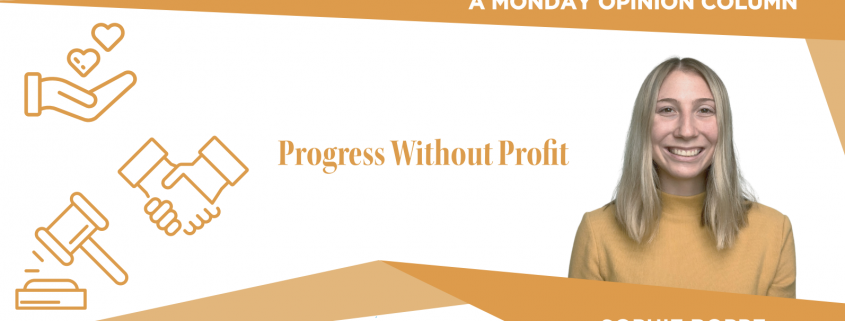Progress Without Profit: It’s time to say goodbye to dark money
Although my awareness of the passage of time has admittedly been off since March, it is hard to forget that the presidential election is less than a month away. With issues such as the coronavirus, a Supreme Court nomination, racial justice and climate change on the ballot, I am glued to my phone, inevitably distracted by the breaking news that occurs daily.
To say there is a lot at stake is an understatement. Knowing this, elections must accurately and transparently reflect and represent voters. One of the first steps to ensuring this is to take the “dark money” filtered through nonprofits out of elections.
When 501(c)(4) nonprofits spend money for political purposes, they do not have to publicly disclose their donors’ identities. Under campaign finance law, this kind of anonymous spending is perfectly legal and known as “dark money.” The ruling in the 2010 Supreme Court case Citizens United v. FEC opened the floodgates for dark money. In that ruling, the Court claimed that to limit “independent political spending” of businesses and other organizations was a limit of the First Amendment’s right to free speech.
This ruling led to the rise of super political action committees, which are organizations that can raise unlimited funds from individuals, corporations or nonprofits to campaign on behalf of a candidate. While super PACs technically have to disclose their donors, 501(c)(4) nonprofits do not, meaning super PACs can receive anonymous donations if it goes through a nonprofit first.
In an effort to stop the sudden influx of dark money, the IRS states that politics cannot be the main purpose of nonprofits if they wish to keep donors anonymous. However, the rules are easy to get around and hardly ever enforced. As a result, in the current system, super PACs receive hundreds of millions of unidentified dollars through nonprofits and use this money to actively campaign for a certain candidate, so long as they are not directly coordinating with that candidate.
By 2014, a mere four years after the Citizens United decision, only 29% of outside spending on state and local campaigns was fully disclosed. In 2016, dark money groups spent almost $181 million in the presidential election. Last month, spending by dark money groups surpassed the $1 billion mark.
Dark money gives billionaires, powerful lobbyists and even foreign entities unchecked and undue influence over the very elections meant to be key to the democratic process.
In the 2016 election, branches of the National Rifle Association labeled as 501(c)(4) nonprofits spent more than $30 million in support of President Donald Trump. In 2017 alone, the NRA had $378 million worth of dark money. We have no way of knowing where that money came from and whom representatives are serving when they refuse to pass gun control legislation.
In 2018, Soviet businessmen Igor Fruman and Lev Parnas were indicted for laundering over $1 million from foreign countries through a shell corporation to a pro-Trump super PAC. With current campaign finance laws and the lack of accountability on the part of dark money groups, interference in United States elections from foreign donors is an all too likely reality.
An anonymous $750,000 donation was given to a third-party group in Wisconsin that supported Gov. Scott Walker in his recall election in 2012. Once Walker won the election, the Republican-controlled legislature quickly changed the state law to make it more difficult for those who suffered adverse effects from lead-paint poisoning to sue lead paint manufacturers. This sudden change in law seems random, right? Well, in 2016, The Guardian leaked documents that disclosed the donor’s identity. The $750,000 was given by Harold Simmons, owner of NL Industries, one of the most historic lead paint manufacturers.
Dark money isn’t unique to one party, however. In the 2018 midterm elections, a study by the government reform group Issue One found that politically active nonprofits spent $150 million worth of dark money, with Democratic-leaning groups accounting for 54% of it.
While the Democratic National Committee adopted a platform last month calling for a ban of dark money, there is doubt whether Democrats, if given the chance, will destroy the very system that enormously funds their campaigns.
There is no law in place that prohibits candidates’ former campaign managers and chiefs of staff from running super PACs and advocating for the very same candidates they used to work under. If former staff members are running these organizations, they know the donors. Therefore, it isn’t a leap to assume the candidates they support and used to work for also have knowledge of these donors’ identities. In that way, candidates may know exactly who they need to repay, while the American people are left in the dark.
Dark money directly inhibits our ability to hold our leaders accountable and creates a veil of secrecy over a process that desperately needs transparency. Political social welfare nonprofits should not be exempt from disclosing donors. We have enough things to worry about this upcoming election — hundreds of millions of dollars of anonymous money infiltrating our political system should not be one of them.
Sophie Roppe is a junior writing about nonprofit organizations and social justice. Her column, “Progress Without Profit,” runs every other Monday.

